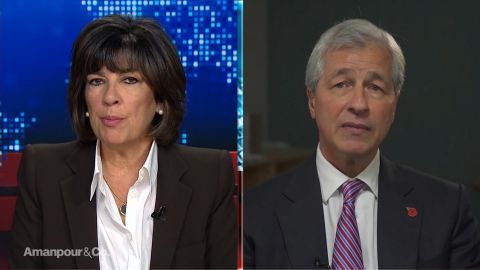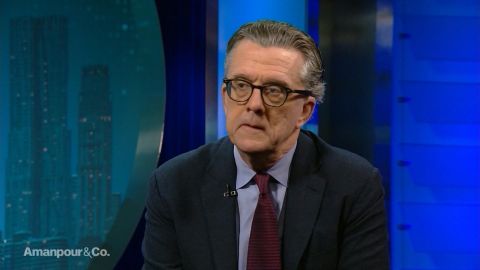Read Transcript EXPAND
CHRISTIANE AMANPOUR: I want to just ask you because you have been quoted as saying that you recognize that people were hurt by the recession and angry with banks for engaging in the risky mortgage lending practices that triggered that recession. I mean, what do you feel about it now and do you still understand people’s feelings and I guess, what can you do about it?
DIMON: Yes. So, we had a great recession. And I think it’s fair that people look at it and say who caused it? It wasn’t my fault. And in general, they look at Wall Street, government and maybe some big companies. I think that’s generally accurate. I think have the right to be angry because it was terrible. You know, having said that, you know look at, what do you want to do to fix the problems and you need a healthy — you know, JPMorgan did not need government help, by the way, but you need a healthy banking system to finance the economy. And so, you know, I listen to Paul Krugman, it’s possible that — I think if people broke the law they should go to jail, honestly. So, I would just take that one off the table. But you need a healthy banking system. You know, I like to be looking forward. What is it we need to do to have things get better? I understand the anger from the past, I understand what people (INAUDIBLE), that isn’t a solution, the solution is jobs, skill, affordable housing, giving phones (ph) a path to work, you know, reduce the opioid crisis, education, you know, the very young to, you know, apprenticeships, those are the things would actually will fix the problem. And so, you now, we tried in the great recession to support everybody. You know, we bought (INAUDIBLE), we help unwind and a great risk to ourselves, part of Lehman Brothers after their failure. We bought WAMU like literally 10 days after Lehman. And so, we try to always lend. We forgave. If I remember correctly, you know, close to — all and close to $100 billion of interest in payments and mortgages. We — you can talk to companies, they’ll tell, “Had it not been for JPMorgan, we wouldn’t have survived.” So, we’re going to be there through thick or thin all the time and try to do our part. And this is a huge effort. So, this type of thing, it is important for companies to participate because the biggest legitimate complaint is all these folks left behind, it is part of what causes populism, it’s somewhat legitimate populism, legitimate anger. If you grow up and you don’t have $400 for a rainy-day fund, I mean, you’re working and you don’t have $40 or $400 a rainy-day fund or you’re — the bridges are terrible, you could have anger. And so, to me, I wish to do what American used to do, roll up your sleeves, look at the problems, analyze them, come to solutions as opposed to just continue to point fingers at various segments like they cause — solely caused all these issues.
About This Episode EXPAND
Christiane Amanpour speaks with Congressman-elect Tom Malinowski, Chairman and CEO of JPMorgan Chase Jamie Dimon, and Prime Minister of Canada Justine Trudeau. Walter Isaacson speaks with journalist Kurt Andersen.
LEARN MORE



